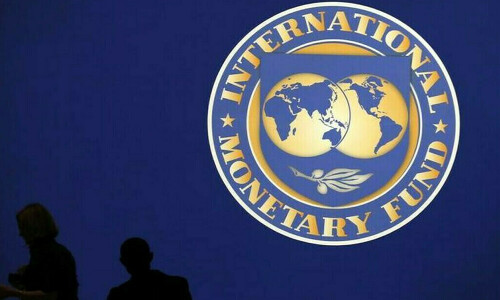IMF Anticipates Lowered Economic Projections Amidst Trade Spats
WASHINGTON: The International Monetary Fund (IMF) is bracing for revisions to its economic forecasts due to escalating trade tensions and substantial transformations in the global trading landscape. However, IMF Managing Director Kristalina Georgieva stated on Thursday that a global recession is not anticipated.
Georgieva noted that national economies are undergoing trials due to an overhaul of the global trade system. This shift, triggered by recent tariffs imposed by the U.S. and retaliatory actions from China and the European Union, has resulted in unprecedented uncertainty in trade policies and significant instability in financial markets.
“Disruptions have consequences…our updated growth forecasts will reflect noticeable downward adjustments, but not a recession,” she stated in her prepared remarks. She added that the updated outlook would also incorporate increased inflation forecasts for certain nations.
Georgieva also pointed out that heightened uncertainty amplifies the potential for financial market turbulence, emphasizing that recent movements in U.S. Treasury yield curves should be regarded as a warning sign. “Everyone is affected if financial conditions deteriorate,” she cautioned.
U.S. President Donald Trump has disrupted the international trade system through a wave of new tariffs, including a 10% duty on goods from all countries and elevated rates for specific items. Although these measures have been suspended for 90 days to facilitate negotiations, China, the EU, and other countries have announced retaliatory actions.
WTO Forewarns of Diminished Trade Expansion in 2025
In January, the International Monetary Fund projected global growth at 3.3% for both 2025 and 2026. An updated World Economic Outlook is scheduled for release on Tuesday.
Speaking from the IMF headquarters in Washington in advance of the IMF and World Bank spring meetings next week, Georgieva refrained from providing specific details regarding the expected revisions. She did, however, warn that prolonged uncertainty would be costly.
She explained that trade tensions have been gradually intensifying and are now reaching a critical point. She urged countries to respond thoughtfully to the rapid and widespread changes observed in tariffs, which have propelled the U.S. effective tariff rate to levels unseen in recent history, prompting responses from other nations.
“As major economies clash, smaller nations are caught in the resulting turbulence,” Georgieva commented. She highlighted that China, the EU, and the U.S. are the world’s leading importers, which implies substantial spillover effects for smaller countries that are more susceptible to tighter financial conditions.
The Detrimental Effects of Protectionism on Innovation
Georgieva stated that increasing tariffs immediately impede growth, noting that historical data indicates that importers bear the burden of higher tariff rates through reduced profits, while consumers face increased costs. In larger economies, tariffs may stimulate new domestic investment, leading to job creation, although this process takes time.
“Protectionism diminishes productivity over the long term, especially in smaller economies,” she cautioned. She also warned that efforts to shield industries from competition undermine entrepreneurship and hinder innovation.
Georgieva advised countries to persist with economic and financial reforms while maintaining adaptable and reliable monetary policies, as well as robust financial market regulation and oversight.
She suggested that emerging market economies should maintain flexibility in their exchange rates and that donor countries should enhance the protection of aid flows to vulnerable, low-income nations.
Georgieva also advocated for collaboration in an increasingly multipolar world, urging the largest economies to reach a trade agreement that preserves openness and reinvigorates the global trend toward reduced tariff rates and fewer non-tariff barriers.
“We require a more robust global economy, not a slide into division,” she concluded. “All nations, regardless of size, can and should contribute to strengthening the global economy in an era characterized by more frequent and severe shocks.”



Comments (0)
No comments yet. Be the first to comment!
Leave a Comment